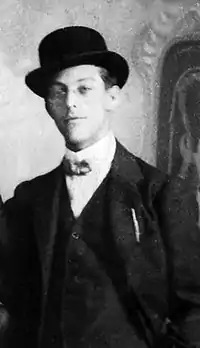Janko Polić Kamov
Janko Polić Kamov (17 November 1886 – 8 August 1910) was a Croatian writer and poet. His literary work was small, but very significant, because in his poems and plays he expressed his anger and displeasure over hypocrisy and injustice of his contemporaries in a way unprecedented in Croatian literature. His masterwork is a modernist novel Isušena kaljuža (1906–1909) saturated with psychosexual and spiritual conflicts of the iconoclastic first-person narrator and later described as a proto-existentialist prose, written decades before the literary movement's appearance. Kamov's novel, invariably described as the premier Croatian avant-garde major prose work, was printed for the first time in 1956. Because of that he earned reputation as one of the greatest rebels and iconoclasts in history of Croatian culture.
Janko Polić Kamov | |
|---|---|
 | |
| Born | 17 November 1886 Rijeka, Austria-Hungary (now Croatia) |
| Died | 8 August 1910 (aged 23) Barcelona, Spain |
| Occupation | Poet, playwright, short story writer, novelist |
| Language | Croatian |
| Period | 1905–1914 |
| Literary movement | Modernism |
Biography
He was born in Sušak, Rijeka. Rebellious by nature, he was expelled from Rijeka high school and dropped out of the school in Zagreb. Because of his participation in the demonstration against the Hungarian governor in Croatia, Khuen-Héderváry, he was sentenced to three months in prison in 1903.[1] Headstrong and temperamental, he called himself Kamov, after Ham (or Kam) from the Old Testament, who saw his father Noah naked but unlike his siblings Shem and Japhet did not cover his nakedness, thus issuing a curse. Kamov probably saw himself as a revealer of bourgeoise hypocrisy and wrote to his brother Vladimir in 1910 - "Kamov to me is a literary program..."
He died at the age of 23 in Barcelona at the Hospital de la Santa Creu and was buried at the Cementeri de Montjuïc, in the common grave for corpses from the hospital that nobody claimed.
Legacy
Kamov is treated as a very special writer within Croatian literature.[2] His writings have been variously labeled as proto-modernist, avant-garde, absurdist, existentialist, futurist and surrealist, and is considered to be a highly original author for the period.[3][4] His work paved way and influenced later Croatian authors such as Miroslav Krleža and Antun Branko Šimić.[5] A number of his works have been translated into English during the 90s such as Sloboda (Freedom) or Žalost (Sorrow),[6] which led the American literary theorist Geoffrey Hartman to describe him as the biggest literary discovery during that period.[7][8]
Works
Poetry
- Psovka (Curse), (Zagreb, 1907)
- Ištipana hartija, (Zagreb, 1907)
Short stories
- Ćaskanja, Izdanje knjižare G. Trbojevića, Rijeka, 1914.
- Ecce Homo
- Brada
- Sloboda
- Žalost
- Katastrofa
- Bitanga
- Žena
- Odijelo
- Stjenica
Drama
- Iznakaženi (written, 17 and 18 December 1904)
- Tragedija mozgova: tri scene (Zagreb, 1907)
- Na rođenoj grudi: dramatizovana studija (Zagreb, 1907)
- Samostanske drame, 1908.
- Orgije monaha
- Djevica
- Čovječanstvo, 1908.
- Mamino srce, 1910.
Novels
- Isušena kaljuža ("A Dried Mire"; 1906–1909)
References
- "Janko Polić Kamov". www.goodreads.com. Archived from the original on 2023-01-16. Retrieved 2019-09-23.
- Kordić, Snježana (1995). "Jedan tip rečenice u novelama Janka Polić Kamova" [One type of clauses in Janko Polić Kamov's novels] (PDF). Fluminensia (in Serbo-Croatian). Rijeka. 7 (2): 85–92. ISSN 0353-4642. OCLC 900644327. SSRN 3442274. CROSBI 447848. ZDB-ID 1278877-6. Archived (PDF) from the original on 22 September 2013. Retrieved 9 March 2018. (CROLIB) Archived 2023-01-16 at the Wayback Machine.
- The Curse, Janko Polic Kamov Archived 2023-01-16 at the Wayback Machine, foreword by Martin Mayhew
- "Janko Polić Kamov". Archived from the original on 2023-01-16. Retrieved 2020-09-28.
- "Hrvatski biografski leksikon". Archived from the original on 2023-01-16. Retrieved 2020-10-01.
- "Matica hrvatska - Hrvatska revija 2, 2019. - Janko Polić Kamov: Samoća, visina i vječnost literata". Archived from the original on 2023-01-16. Retrieved 2020-09-28.
- "Janko Polić Kamov – nikada do kraja shvaćen ni prihvaćen". Archived from the original on 2019-05-06.
- "Budimpešta, 1909". Archived from the original on 2023-01-16. Retrieved 2020-09-28.
External links
| Library resources |
| By Janko Polić Kamov |
|---|
- Janko Polić Kamov at Library of Congress
- Janko Polić Kamov, unofficial webpage, includes Kamov work Archived 2006-04-24 at the Wayback Machine (in Serbo-Croatian)